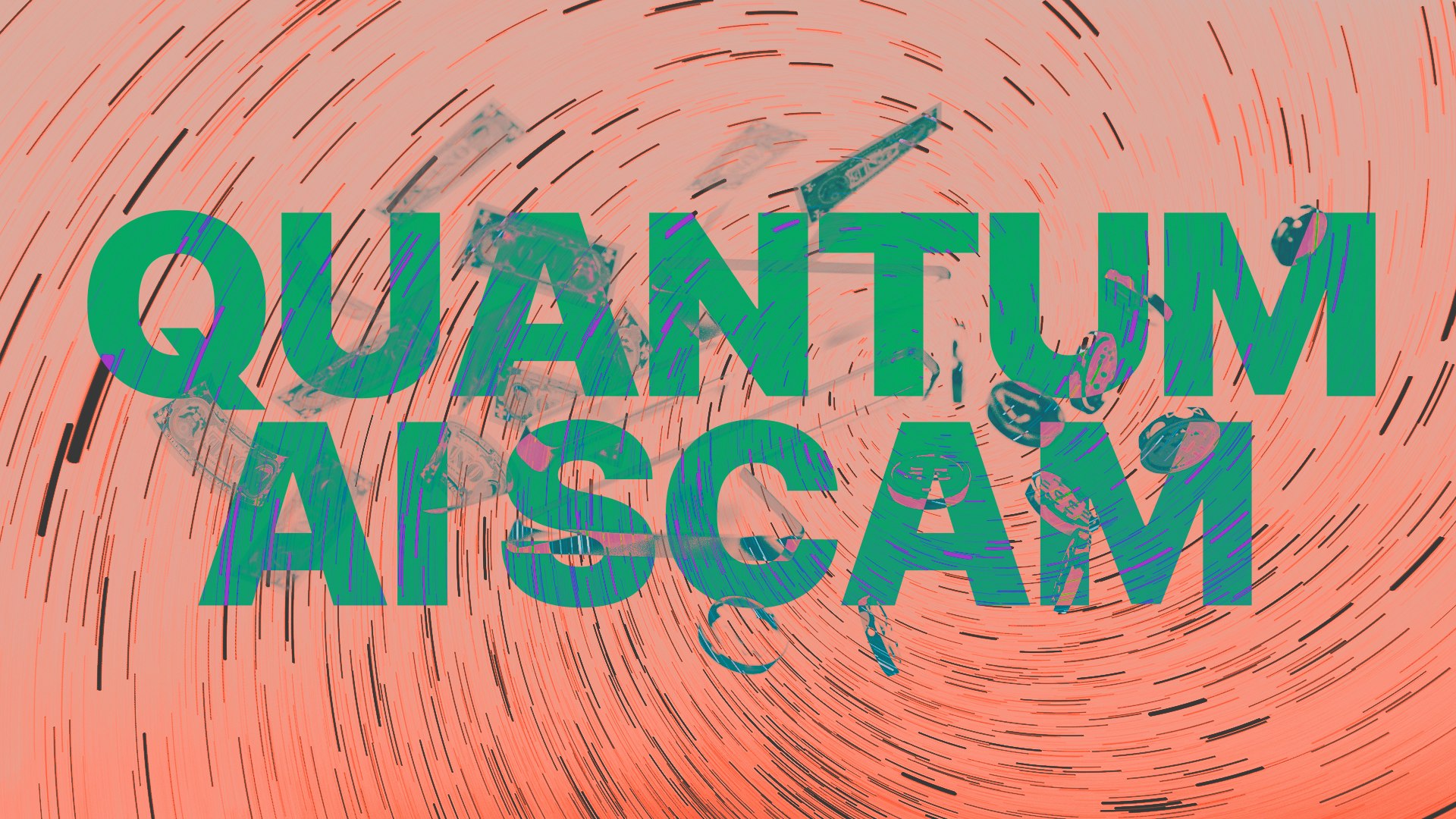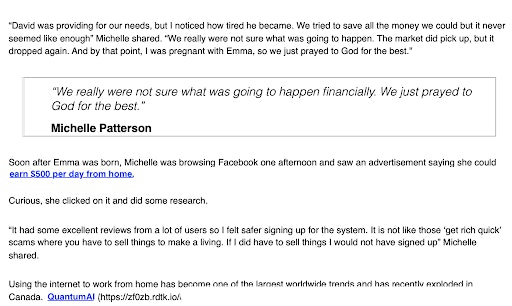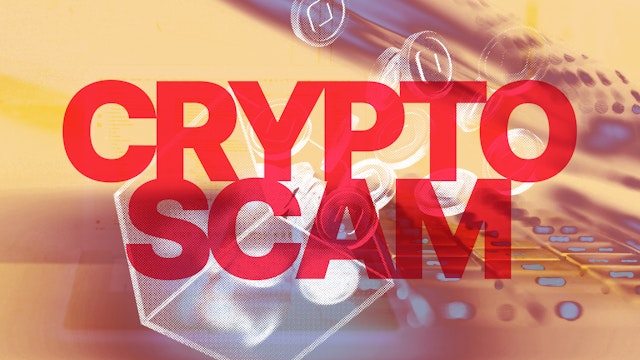Unmasking the Quantum AI Scam – Here are the Tactics
The Quantum AI scam is on the rise. Here's what to look out for.
In this article...
- What is the Quantum AI scam and how does it work?
- How can you protect yourself from falling victim?
- Learn to identify the tactics used by these scammers.

What is a Quantum AI scam? In the age of online shopping and digital convenience, it's essential to remain vigilant against scams, particularly those designed to lure unsuspecting consumers with eye-catching ads and promises of quick riches.
A recent scam involving a product ad on Facebook and a subsequent fake news page leads victims to a fraudulent trading platform, Quantum AI. Let’s dissect each step of the scam, exposing the red flags that signal danger.
The Facebook ad: A misleading start
The journey begins with a seemingly innocent Facebook ad for a handheld vacuum cleaner, showing a generic image of a device cleaning up confetti.
While the ad appears harmless, the product itself doesn’t link to a reputable e-commerce site like Amazon or eBay. Instead, it directs users to a suspicious and unknown domain.

Red flags
No recognisable brand: The ad lacks any known brand or company association.
Suspicious URL: Clicking the link doesn’t lead to a trusted site but to a domain that raises immediate questions.
Generic promotion: The language used, such as "state-of-the-art vacuum cleaner," is vague, offering no clear product details or specifications.
Stock imagery in use: We can see the Adobe Stock watermark across the video, indicating the video has been taken without authorisation.
The Fake News Page: “Stories” that trick you into trusting
After clicking the ad, users are redirected to a dubious “news” site that features a story about a woman named Michelle who supposedly made thousands using a crypto trading platform called Quantum AI.

The page mimics the layout of a legitimate news site but is filled with hyperbolic claims, personal stories, and suspicious links that all lead back to Quantum AI.

The page mimics the layout of a legitimate news site but is filled with hyperbolic claims, personal stories, and suspicious links that all lead back to Quantum AI.
It uses fabricated interviews and success stories to prey on the reader’s emotions and curiosity.
Red flags
Fake success stories: The featured story about Michelle hiding $7,239 per month from her husband is clearly fabricated, designed to build an emotional connection and encourage readers to follow suit.
Over-the-top earnings claims: Phrases like "make $500 per day" or "checks totaling $1,320.42" scream scam, especially when tied to promises of effortless riches.
Suspicious disclaimers: At the bottom of the page, disclaimers mention that the page’s content is not to be taken literally, which is a clear indication that the entire article is falsified.
3. The Quantum AI scam: The final trap
The final destination of this scam is the Quantum AI website, which promises users the ability to earn money automatically using artificial intelligence and quantum computing to trade cryptocurrencies.

The site pushes visitors to input their personal information, such as their name, email, and phone number, under the guise of starting a quick, profitable venture. It plays heavily on urgency with phrases like “spots are filling up fast!” and “start earning today!” to press readers into hasty decisions.
Red flags
No clear company information: There is no verifiable contact information, no legal disclaimers, and no trace of legitimacy. No credible company operates without these key components.
False claims about AI and quantum computing: While AI and quantum computing are real technologies, there’s no evidence that this platform utilises either. These buzzwords are used to create a sense of credibility where none exists.
Pressure tactics: Scammers often rely on tactics like “limited spots” to create urgency, preventing victims from thinking critically before entering personal data.
Concerning advertising: If you got to this company from a fake vacuum cleaner ad, they are not legitimate.
##Conclusion: Recognising and avoiding scams
This particular scam highlights several tactics that scammers use to deceive and defraud unsuspecting users:
Vague product descriptions and unknown links.
Fabricated personal stories that tug at emotional heartstrings.
Too-good-to-be-true promises of easy and fast money.
Urgency and pressure tactics to force quick decisions.
Always be wary of unknown brands or sites, especially when they link to suspicious domains. Do your research, trust your instincts, and don’t let the allure of quick cash cloud your judgement. If something feels off, it probably is.
Extra resources
Please refer to our support article if you feel you have been scammed.
Citizens information: How to avoid scams
Use CheckMyLink to verify the authenticity and safety of online shopping websites. It is managed by Cyber Skills, in partnership with ScamAdviser and An Garda Síochána. You can check that the website you are using is genuine and free from harmful software by providing the website URL (link).
You can stay aware of scams using government agency warnings, such as those on the Garda website and the Department of Social Protection (DSP).
Read more about online safety, detailed by Coimisiún na Meán, the regulator of online safety in Ireland.
Get advice and information on scam calls and scam texts from the Commission for Communications Regulation (ComReg).
The Banking and Payment’s Federation Ireland’s (BPFI) FraudSMART initiative has some useful resources on protecting yourself from fraud.
The Competition and Consumer Protection Commission (CCPC) has information about how to watch out for scams.


Suggested Articles

Scam Uses Popular Anime Characters to Steal Your Money or Crypto
Have you seen your favourite character in an ad online? It might not be a legitimate use of the image. Here are the red flags to look for.Read more
Bitcoin Mining Scam: What to Look Out For
The Bitcoin Mining Scam is a new online threat coming at us. Our compliance expert explains another sophisticated scam to look out for.Read more
Christmas Scams: Tips to Stay Safe During the Holiday Season
New scams are on the loose. Here's one to be careful of at Christmas time. Read moreBrowse by topic
Warning: Past performance is not a reliable guide to future performance. If you invest in this product, you may lose some, or all, of the money you invest. The above information is not to be read as investment, legal or tax advice and takes no account of particular personal or market circumstances; all readers should seek independent investment, legal and tax advice before investing in cryptocurrencies. There are no government or central bank guarantees in the event something goes wrong with your investment. This information is provided for general information and/or educational purposes only. No responsibility or liability is accepted for any errors of fact or omission expressed therein. CoinJar Europe Limited makes no representation or warranty of any kind, express or implied, regarding the accuracy, validity, reliability, availability, or completeness of any such information. CoinJar Europe Limited is authorised by the Central Bank of Ireland as a crypto-asset service provider (registration number C496731).
Your information is handled in accordance with CoinJar’s Privacy Policy.
Warning: Past performance is not a reliable guide to future performance. If you invest in this product, you may lose some, or all, of the money you invest. The above information is not to be read as investment, legal or tax advice and takes no account of particular personal or market circumstances; all readers should seek independent investment, legal and tax advice before investing in cryptocurrencies. There are no government or central bank guarantees in the event something goes wrong with your investment. This information is provided for general information and/or educational purposes only. No responsibility or liability is accepted for any errors of fact or omission expressed therein. CoinJar Europe Limited makes no representation or warranty of any kind, express or implied, regarding the accuracy, validity, reliability, availability, or completeness of any such information.
CoinJar Europe Limited is authorised by the Central Bank of Ireland as a crypto-asset service provider (registration number C496731).
For more information on our regulatory status and the crypto-asset services we are authorised to provide, please see our official announcement and our MiCAR Legal & Regulatory Information page.
Apple Pay and Apple Watch are trademarks of Apple Inc. Google Pay is a trademark of Google LLC.
This site is protected by reCAPTCHA and the Google Privacy Policy and Terms of Service apply.

